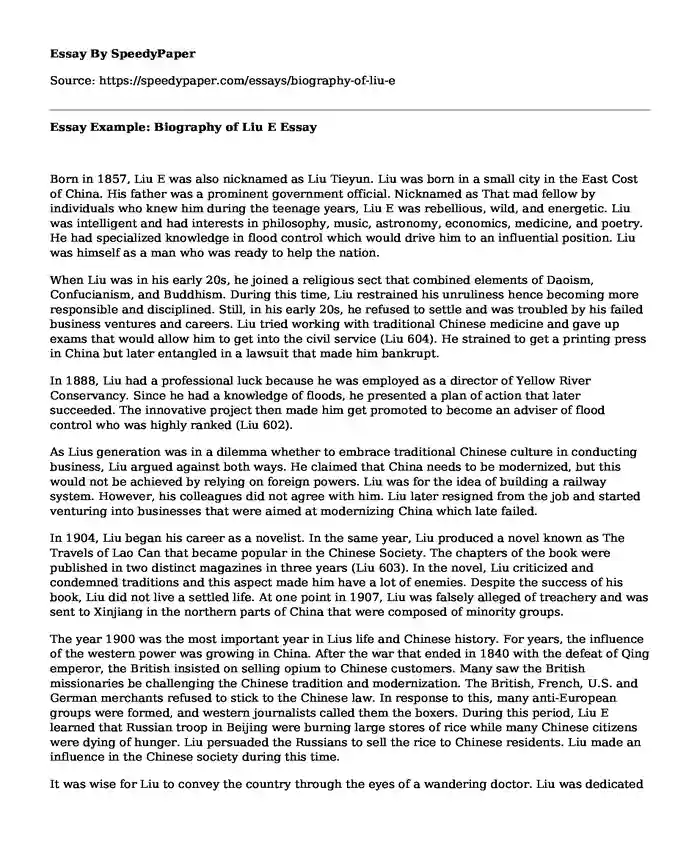Born in 1857, Liu E was also nicknamed as Liu Tieyun. Liu was born in a small city in the East Cost of China. His father was a prominent government official. Nicknamed as That mad fellow by individuals who knew him during the teenage years, Liu E was rebellious, wild, and energetic. Liu was intelligent and had interests in philosophy, music, astronomy, economics, medicine, and poetry. He had specialized knowledge in flood control which would drive him to an influential position. Liu was himself as a man who was ready to help the nation.
When Liu was in his early 20s, he joined a religious sect that combined elements of Daoism, Confucianism, and Buddhism. During this time, Liu restrained his unruliness hence becoming more responsible and disciplined. Still, in his early 20s, he refused to settle and was troubled by his failed business ventures and careers. Liu tried working with traditional Chinese medicine and gave up exams that would allow him to get into the civil service (Liu 604). He strained to get a printing press in China but later entangled in a lawsuit that made him bankrupt.
In 1888, Liu had a professional luck because he was employed as a director of Yellow River Conservancy. Since he had a knowledge of floods, he presented a plan of action that later succeeded. The innovative project then made him get promoted to become an adviser of flood control who was highly ranked (Liu 602).
As Lius generation was in a dilemma whether to embrace traditional Chinese culture in conducting business, Liu argued against both ways. He claimed that China needs to be modernized, but this would not be achieved by relying on foreign powers. Liu was for the idea of building a railway system. However, his colleagues did not agree with him. Liu later resigned from the job and started venturing into businesses that were aimed at modernizing China which late failed.
In 1904, Liu began his career as a novelist. In the same year, Liu produced a novel known as The Travels of Lao Can that became popular in the Chinese Society. The chapters of the book were published in two distinct magazines in three years (Liu 603). In the novel, Liu criticized and condemned traditions and this aspect made him have a lot of enemies. Despite the success of his book, Liu did not live a settled life. At one point in 1907, Liu was falsely alleged of treachery and was sent to Xinjiang in the northern parts of China that were composed of minority groups.
The year 1900 was the most important year in Lius life and Chinese history. For years, the influence of the western power was growing in China. After the war that ended in 1840 with the defeat of Qing emperor, the British insisted on selling opium to Chinese customers. Many saw the British missionaries be challenging the Chinese tradition and modernization. The British, French, U.S. and German merchants refused to stick to the Chinese law. In response to this, many anti-European groups were formed, and western journalists called them the boxers. During this period, Liu E learned that Russian troop in Beijing were burning large stores of rice while many Chinese citizens were dying of hunger. Liu persuaded the Russians to sell the rice to Chinese residents. Liu made an influence in the Chinese society during this time.
It was wise for Liu to convey the country through the eyes of a wandering doctor. Liu was dedicated to healing and advocated for justice and mitigation of suffering. Lius novel reflected his life and had been read as an autobiographical. Tieyun is the heros name that means Iron Cloud. In the book, Liu shares the name with the hero. The language in his novels borrowed a lot of images and illusions from Classical Chinese literature. Liu used symbolism in all his works of art. The Travels of Lao Can is one of his best works that is widely studied in Chinese society. In his novel, he condemned the corrupt government officials (Liu 602). Liu wrote this novel in literary Chinese where he invoked chivalric ideals heroism and justice through the use of the main character. Lao Can have been translated into at least seven languages (Japanese, English, Russian, Czech, French, Germany, and Hungarian). This work of art made him become one of the most famous authors in China. Most of Lius novels were written in vernacular prose (Luke 370).
At one point in 1907, Liu was falsely alleged of treachery and was sent to Xinjiang in the northern parts of China that were composed of minority groups. Liu died after thirteen months of exile.
Lius political criticism marks a significant aspect of Chinas contemporary transformation. He never accepted politics to be the key to Chinas problems. Many political radicals advocated for a political solution in their endeavors to modernize China. However, Liu did not concur with them (Luke 370). He instead criticized the political system of China. Lius legacy still reigns in the Chinese society.
Works Cited
Luke S. K. Kwong. "Self and Society in Modern China: Liu E (1857-1909) and "Laotian Youji" T'oung Pao Second Series 87.4/5 (2001): 360-92. Web.
Liu, E. The Travels Of Lao Can. Ithaca: Cornell University Press, 1952. Print.
Cite this page
Essay Example: Biography of Liu E. (2019, Nov 18). Retrieved from https://speedypaper.net/essays/biography-of-liu-e
Request Removal
If you are the original author of this essay and no longer wish to have it published on the SpeedyPaper website, please click below to request its removal:
- Free Essay Sample: Advancement in the Hospitality Industry
- Impact of Social Media on Human Interactions in Free Essay
- Essay Example: Meaning and Importance of Strategy
- Music Essay Example: Wagner, Modern Opera, And Terror
- Free Paper with a Report on BMW's Contemporary Business Strategy
- Free Essay Exploring the Influence of Songs to the Civil Right Movement
- Free Essay: The Curbing of Terrorism
Popular categories





